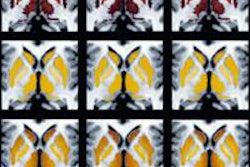
A specialized MRI scanning protocol has detected differences in brain signals in the white matter and cerebellum of individuals with bipolar disorder -- changes that were not evident in bipolar patients receiving lithium treatment.
Researchers from the University of Iowa scanned 15 patients with bipolar disorder and 25 normal controls matched for age and gender. The bipolar patients were all in a normal (euthymic) mood state during the scans, according to a paper published January 6 in Molecular Psychiatry.
A research team led by first author Casey Johnson, PhD, used an MRI technique called quantitative high-resolution T1 rho mapping, which is sensitive to byproducts of cell metabolism such as levels of glucose and acidity in the brain. The scans found elevated MRI signals in cerebral white matter and the cerebellar region of bipolar patients but not in the normal controls -- and not in the bipolar patients taking lithium.
 T1 rho MRI scans show brain regions of elevated signal in 15 patients with bipolar disorder compared to 25 control subjects. The primary regions of difference are the cerebral white matter (yellow) and the cerebellum (red). Image courtesy of the University of Iowa.
T1 rho MRI scans show brain regions of elevated signal in 15 patients with bipolar disorder compared to 25 control subjects. The primary regions of difference are the cerebral white matter (yellow) and the cerebellum (red). Image courtesy of the University of Iowa.The researchers believe the changes could be due to factors influenced by cell metabolism, such as a reduction in pH or a reduction in glucose concentration. Previous research has linked abnormal cell metabolism to bipolar disorder, but imaging tools have been too slow or cumbersome, or they lacked the resolution to provide high-quality images of the entire brain.
The University of Iowa researchers believe their study is one of the first to use the T1 rho mapping protocol to investigate a psychiatric disease. And until now, the cerebellum hasn't been highlighted in bipolar research, according to the authors.
The findings with respect to lithium are interesting because they indicate that the substance may target the cerebellum and alter glucose levels in that region. If that's the case, then a more targeted treatment that performs the same function could be developed to work without the side effects common to lithium treatment, the authors noted.



















